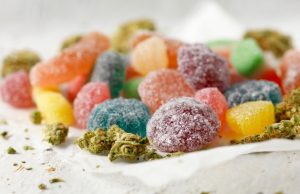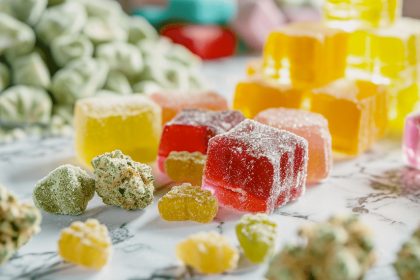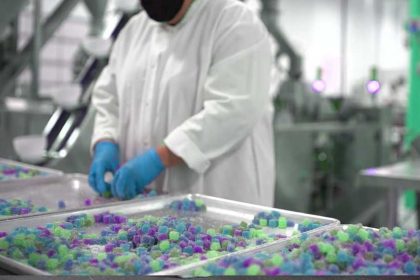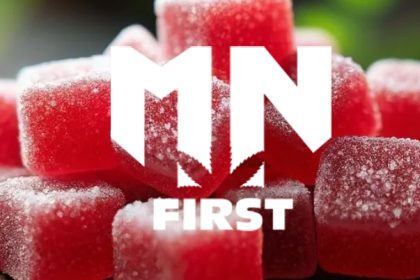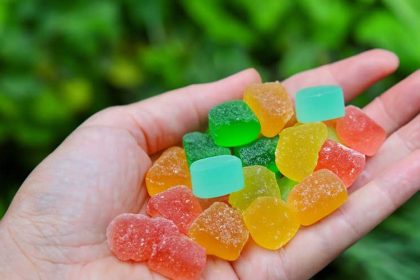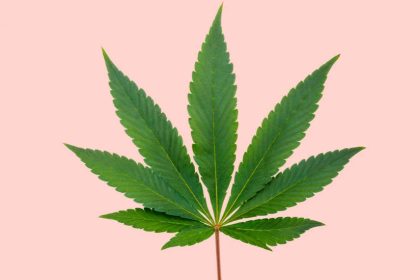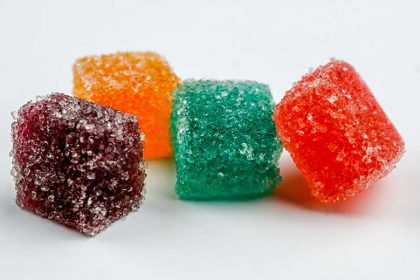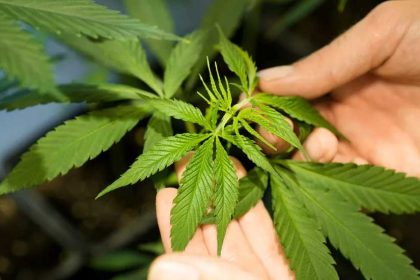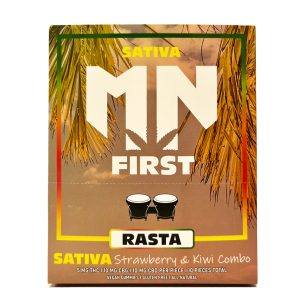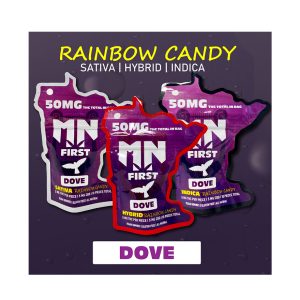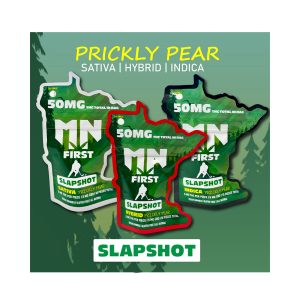Recover From Edibles
You’ve probably heard stories about people who have overindulged in edibles, leading to some pretty uncomfortable experiences. If you find yourself in this situation, it’s essential to know how to manage the symptoms and recover effectively. Recognizing the signs of overconsumption such as anxiety, altered perception, and stomach issues is the first step. This article offers detailed strategies like controlled breathing, staying hydrated, and getting proper nourishment. But what do you do when these initial steps don’t seem to help? Let’s explore further to make sure you handle the situation with confidence and ease.
Recognizing Overconsumption Symptoms
When you consume too many edibles, you may experience symptoms such as intense anxiety, paranoia, and a markedly altered perception of time. These reactions stem from the high concentration of THC found in edibles, which can take longer to metabolize compared to inhaled cannabis. It’s important to recognize these symptoms early to effectively manage the situation.
Physiologically, overconsumption can lead to tachycardia (increased heart rate), dry mouth, and dizziness. You might also encounter gastrointestinal discomfort, including nausea or vomiting. Psychologically, aside from anxiety and paranoia, you could experience hallucinations or delusions, where your sense of reality becomes notably distorted.
It’s essential to differentiate these symptoms from other medical conditions. For instance, if you have pre-existing heart conditions, tachycardia induced by THC may pose additional risks. Similarly, severe anxiety could exacerbate underlying mental health disorders. Recognizing these signs helps you take the necessary steps to mitigate the adverse effects.
Knowing the onset and duration of these symptoms is important. Edibles typically take 30 minutes to 2 hours to kick in and can last up to 12 hours. Being aware of this timeline can help you avoid further consumption and better manage the symptoms you’re experiencing.
Staying Calm and Relaxed
To mitigate the effects of overconsumption, focus on practicing controlled breathing techniques to help reduce anxiety.
Make sure you’re in a comfortable environment that promotes relaxation, such as a quiet room with dim lighting.
These strategies can greatly aid in managing the psychological and physiological effects of excess edibles.
Breathing Techniques
Utilizing controlled breathing techniques can greatly aid in managing the anxiety and discomfort often associated with overconsumption of edibles. Begin by focusing on your breath, inhaling deeply through your nose for a count of four. Hold the breath for another count of four, then exhale slowly through your mouth for a count of six. This method, known as diaphragmatic breathing, activates the parasympathetic nervous system, promoting relaxation and reducing anxiety.
Another effective technique is the 4-7-8 method. Inhale through your nose for four seconds, hold your breath for seven seconds, and then exhale through your mouth for eight seconds. This pattern slows your heart rate, helping to mitigate the rapid heartbeat often induced by THC overconsumption.
Additionally, you might find the practice of box breathing beneficial. Inhale for four seconds, hold for four, exhale for four, and pause for four seconds before repeating. This technique can stabilize your physiological state and improve mental clarity.
Controlled breathing isn’t just a distraction; it’s grounded in evidence-based practice. Research shows that these techniques can lower cortisol levels, reduce heart rate, and improve emotional regulation. By incorporating these methods, you’ll foster a sense of calm and regain control over your experience.
Comfortable Environment
Creating a comfortable environment is vital to further alleviate the anxiety and discomfort that may arise from overconsumption of edibles. When you find yourself in this situation, the physical and emotional setting plays a pivotal role in your recovery process. Here are four key steps to help establish a soothing environment:
- Choose a Quiet Space: Find a calm, quiet space away from loud noises and distractions. This helps reduce sensory overload, which can exacerbate feelings of anxiety and paranoia.
- Dim Lighting: Bright lights can be overly stimulating. Opt for dim lighting or natural light to create a more relaxing atmosphere. The softer light can help soothe your senses and promote relaxation.
- Comfortable Temperature: Make sure the room temperature is comfortable. Extremes in temperature can cause physical discomfort and stress. A moderate temperature helps maintain physical well-being, contributing to overall calmness.
- Soft Textures: Surround yourself with soft, comfortable furnishings like pillows, blankets, or a cozy chair. These tactile comforts can provide a sense of security and ease, helping to ground you during periods of heightened anxiety.
Hydrate and Nourish
To efficiently mitigate the effects of edibles, you should prioritize hydration and proper nourishment. Regularly drinking water helps maintain peak body function, while eating light snacks can stabilize your blood sugar levels.
Importantly, avoid alcohol consumption as it may worsen the adverse effects.
Drink Water Regularly
Consistently drinking water is crucial for maintaining hydration and supporting your body’s natural detoxification processes. When you’ve consumed edibles, THC and other cannabinoids can cause dehydration, leading to symptoms like dry mouth, dizziness, and headaches. Staying well-hydrated helps mitigate these effects and aids in your overall recovery.
To optimize your hydration, follow these evidence-based strategies:
- Drink Small Amounts Frequently: Instead of consuming large quantities of water at once, sip small amounts regularly. This approach guarantees steady hydration without overloading your system.
- Monitor Urine Color: Your urine should be light yellow. Darker urine indicates dehydration, signaling that you need to increase your water intake.
- Avoid Caffeinated Beverages: Caffeine acts as a diuretic, which can exacerbate dehydration. Stick to water or herbal teas to maintain peak hydration levels.
- Incorporate Electrolytes: When hydrating, consider drinks with added electrolytes, especially if you’re experiencing significant dehydration. Electrolytes help balance your body’s fluids and improve overall hydration efficiency.
Eat Light Snacks
In addition to staying hydrated, consuming light snacks can further aid in your recovery by providing necessary nutrients and maintaining blood sugar levels. Choosing the right snacks is important; opt for nutrient-dense options that are easy to digest.
Fresh fruits like bananas and apples are excellent choices as they offer a quick source of natural sugars and essential vitamins. Nuts and seeds provide healthy fats and proteins that can stabilize your metabolism and energy levels.
Complex carbohydrates such as whole-grain crackers or oatmeal can also help, as they release glucose slowly into your bloodstream, preventing sudden spikes and crashes in energy. Avoid heavy, greasy foods that might exacerbate nausea or gastrointestinal discomfort. Instead, go for small, frequent portions to avoid overwhelming your digestive system.
It’s important to listen to your body’s hunger cues and not force yourself to eat if you’re feeling queasy. Simple, bland foods like toast or rice can be effective in settling your stomach. Remember, the goal is to nourish your body without adding any additional stress.
Integrating these light snacks into your recovery plan can greatly enhance your overall well-being.
Avoid Alcohol Consumption
Avoiding alcohol consumption is essential during your recovery period, as alcohol can dehydrate you further and worsen symptoms. When recovering from edibles, your body needs proper hydration and nourishment to stabilize. Alcohol disrupts these processes, leading to increased dehydration, impaired judgment, and exacerbation of any adverse effects you’re experiencing from the edibles.
To make sure your recovery is as smooth as possible, follow these guidelines:
- Hydrate Frequently: Drink water consistently throughout the day. Aim for at least 8-10 glasses to replenish lost fluids. Electrolyte-rich drinks like sports drinks or coconut water can also be beneficial.
- Eat Balanced Meals: Focus on nutrient-dense foods that provide sustained energy. Incorporate fruits, vegetables, lean proteins, and whole grains into your meals to support your body’s recovery processes.
- Rest Adequately: Make sure you get enough sleep, as rest is vital for your body to process both the edibles and recover from any side effects. Aim for 7-9 hours of quality sleep per night.
- Monitor Symptoms: Keep track of how you feel throughout the day. If symptoms persist or worsen, consider seeking medical advice to rule out any complications.
Distract Yourself
Engaging in a simple activity can help divert your attention and mitigate the effects of overconsumption of edibles. Distraction techniques are a practical approach rooted in cognitive-behavioral therapy (CBT), which suggests that focusing on a different task can reduce anxiety and other adverse symptoms.
Consider engaging in light physical activities such as walking or stretching. Physical movement can facilitate the release of endorphins, which can improve your mood and reduce feelings of unease. Additionally, engaging in creative tasks like drawing or listening to music can help shift your focus away from uncomfortable sensations. These activities stimulate different areas of the brain, promoting a state of relaxation and calm.
Interactive distractions such as puzzles, games, or engaging in a conversation with a friend can also be beneficial. Social interactions, in particular, can provide emotional support and a sense of normalcy, which can be reassuring during periods of distress.
It’s essential to choose activities that you find enjoyable yet not overly stimulating. The goal is to create a balanced sensory environment that diverts your mind without overwhelming it.
Sleep and Rest
Adequate sleep and rest are critical components in recovering from the intense effects of edibles. When you consume edibles, the psychoactive compounds, primarily THC, can have prolonged effects on your body and mind. Ensuring sufficient sleep can help your body metabolize these compounds more efficiently, aiding in a quicker recovery.
To facilitate ideal sleep and rest, consider the following steps:
- Create a Calm Environment: Make sure your sleeping area is quiet, dark, and comfortable. This environment can promote relaxation and help you fall asleep more easily.
- Practice Deep Breathing: Engage in deep breathing exercises before bed. This can lower your heart rate and reduce anxiety, making it easier to drift into sleep.
- Avoid Stimulants: Stay away from caffeine and other stimulants, which can interfere with your ability to fall asleep and stay asleep.
- Establish a Routine: Try to go to bed and wake up at the same time every day. A consistent sleep schedule can regulate your body’s internal clock, promoting better sleep quality.
Seek Professional Help
If you’ve tried various self-care measures like adequate sleep and still find the effects of edibles overwhelming, seeking professional help is advisable. Medical professionals can offer interventions that mightn’t be accessible through self-care.
One immediate option is to visit an urgent care center or an emergency department where clinicians can monitor your essential signs, administer supportive treatments, and make sure you’re safe.
Healthcare providers can also offer medications to alleviate severe anxiety or nausea, common symptoms of overconsumption. Benzodiazepines, for instance, may be prescribed to manage extreme anxiety, while antiemetics can help control nausea and vomiting. These medications are administered in controlled doses and monitored for efficacy and safety.
Additionally, mental health professionals, such as clinical psychologists and psychiatrists, can offer cognitive-behavioral strategies to manage anxiety and panic attacks induced by edibles. This approach is evidence-based and has shown efficacy in mitigating acute psychological symptoms.
In severe cases, inpatient care might be recommended to make sure thorough monitoring and support. Professionals can also provide education on the pharmacokinetics of edibles, helping you understand how they metabolize and why symptoms persist.
Seeking professional help provides a structured and evidence-based approach to recovery.
Prevent Future Overconsumption
To prevent future overconsumption of edibles, start by educating yourself on appropriate dosing and understanding the delayed onset of effects. Unlike smoking, edibles can take anywhere from 30 minutes to 2 hours to kick in, making it easy to consume too much too quickly.
Following these guidelines can help mitigate this risk:
- Understand Dosing: Begin with a low dose, typically 2.5 to 5 mg of THC. This is especially important if you’re new to edibles or have a low tolerance.
- Read Labels Carefully: Pay attention to the total THC content in the product and serving size. Many edibles contain multiple servings, and consuming the entire product can lead to significant overconsumption.
- Wait Before Consuming More: After ingesting an edible, wait at least 2 hours before considering another dose. This gives your body sufficient time to metabolize the THC and for you to feel its full effects.
- Keep a Consumption Journal: Document the type, dosage, and effects of the edibles you consume. This record will help you identify your best-suited dose and understand how different products affect you.

